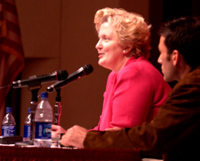The University Senate condemned the decision-making process that resulted in the Pilot Program for Athletic Scholarships at a Feb. 12 meeting.
A letter of recommendation, based on this motion, will be given to the Board of Trustees, during their meeting today. The Board technically has the last say in the university’s decision-making process and could determine if athletic scholarships will be distributed next year.
Interim President the Rev. William Byron, S.J., stated, through e-mail, “the athletic scholarships proposal will be discussed at the Board meeting on Friday and the result of that discussion will be made public after the meeting.”
In the letter of recommendation, Nancy Dupont, University Senate Chair, asked for “the awarding of scholarships (to) be postponed until the faculty can get involved in the discussion, implementation, and assessment of the program.”
Ultimately, it was Byron’s unilateral decision that upset faculty, not the actual athletic scholarships, according to Dupont.
She said the concerns of the faculty resulted from “the process that produced it rather than a blanket rejection of athletic scholarships in general.”
“There are many professors like me who actually favor athletic scholarships,” Dupont said.
Eight anonymous Senate members voted in favor of the pilot program itself at the Senate’s Feb. 12 meeting. However, none voted against the Senate motion objecting to the process in which the program was enacted.
Political science professor Peter Burns, who has been an advocate of the program, declined to answer questions concerning the Senate’s recommendation, claiming that he needed more time to give appropriate responses.
Another factor brought up by the Senate’s recommendation focuses on the university’s upcoming reaffirmation of accreditation from the Southern Association of Colleges and Schools, an agency which examines educational institutions and decides to grant, continue, reaffirm or withdraw accreditation. According to Dupont, if SACS reviewers find that the university has not been in compliance with procedural standards, Loyola’s accreditation could be in jeopardy.
Robert Gnuse, professor of religious studies, agreed that, as he sees it, the program itself was not making problems. He didn’t think the rest of the faculty had a strong preference on the program.
“I’m not real passionate either way about the scholarships themselves,” Gnuse said..
A large number of students strongly support the pilot program and athletic scholarships in general, according to a summary report of the Town Hall Meeting held Feb. 5.







